2024-12-05 Thu
■ #5701. 南アフリカ英語を特徴づける語彙 [south_africa][variety][afrikaans][lexicology][borrowing]
南アフリカで話される英語 "South African English" をめぐる事情は,歴史が込み入っており,関与する言語・変種も多様で一筋縄では行かない.本ブログでは「#343. 南アフリカ共和国の英語使用」 ([2010-04-05-1]) をはじめとして,south_africa の記事群で取り上げてきた.
今回は,南アフリカ英語に端を発し,同変種を特徴づける語彙を紹介したい.3点の文献を参照し,南アフリカ英語らしい単語を,重複しない2つのリストで提示する.
【 Baugh and Cable (312--13) より 】
aardvark(ツチブタ),apartheid(人種隔離制度,アパルトヘイト),veld(t)(広々とした草原),commandeer(徴兵する),commando(市民騎馬軍団),trek(牛車で旅をする),biltong(塩味の切り干し肉),braaivleis(バーベキューパーティ),donga(峡谷),gogga(昆虫),koeksisters(ひねりドーナツ),kopje(小丘),mealies(トウモロコシ),ou(やつ,男),spruit(小川),stoep(ベランダ),veldskoen(革靴)
【 Crystal (English, 40) および Crystal (Encyclopedio, 377) より 】
advocate (法廷弁護士),bad friends (話し合うほどではない仲の者たち),bakkie (軽トラック),bell (電話する),bioscope (映画),boer (ボーア人),bottle store (酒屋),butchery (肉屋),camp (牧草地),dinges (何とかいうもの),dorp (村),eland (イランダ),fundi (専門家),gnu (ヌー),homeland (ホームランド;アパルトヘイト政策によって設けられた黒人住民のための自治区),impala (インパラ),indaba (会議),indri (インドリ),kloof (峡谷),kraal (村落;小屋),lekker (良い),mamba (マムバ),putu (パン状のかゆ),rand (ランド;南アフリカ共和国の通貨),robot (信号機),shebeen (もぐりの黒人酒場),spoor (わだち),springbok (スプリングボック),arvey (午後;= afternoon),tse-tse (ツェツェバエ),verkrampte (超保守主義者;極めて頑迷な),voorskot (前貸し金)
なお,南アフリカ英語の語彙については,同変種版の OED というべき A Dictionary of South African English on Historical Principles (OUP, 1996) が詳しい典拠となる.
・ Baugh, Albert C. and Thomas Cable. A History of the English Language. 6th ed. London: Routledge, 2013.
・ Crystal, David. The English Language. 2nd ed. London: Penguin, 2002.
・ Crystal, David. The Cambridge Encyclopedia of the English Language. Cambridge: CUP, 1995. 2nd ed. 2003.
2022-04-17 Sun
■ #4738. 南アフリカ英語の歴史に生じた "swamping"? [sociolinguistics][south_africa][variety][founder_principle]
移民・植民による新しい変種はいかにして形成されるのか.これは近年の歴史社会言語学でおおいに注目されている問題である.Trudgill や Mufwene に代表される論客が様々な説を提唱してきた.初期の移民人口がいかなる比率でどのような変種を携えていたかといった人口統計学的要因が決定的に重要であるという見解もあれば,リーダー的な話者集団,すなわち "founder" が話している変種こそが,その後の変種の方向性を決めるという見解もある(後者については「#1841. AAVE の起源と founder principle」 ([2014-05-12-1]) を参照).
Millar (38--40) によると,また別の見解として "swamping" という過程が考え得るという.現在の南アフリカ英語の諸特徴は,初期の移民史を参照しても,うまく説明することができない.初期の移民史によって説明し得る諸特徴は,1850年代の新たな移民を契機に「水没」してしまい,現在まで痕跡を残していない,というのが "swamping" 説の主旨だ.
現在の南アフリカ英語には多分に東南イングランド英語の言語特徴が含まれるといわれるが,これは単純に移民史をたどるだけでは説明がつかないという.Millar (39) より引こう.
There is some evidence which suggests . . . that this South-Eastern English predominance does not represent well the history of the first English-speaking immigrants of the 1820s, when the Cape and its surrounding districts had newly been brought under British control. (English speakers would have been regular visitors to the Cape during the period of Dutch rule; they would have been unlikely to have made a lasting impression on the linguistic history of the region, however.) The settlers of the 1850s in KwaZulu-Natal may be more representative of the later speech patterns of South African English . . . . Practically all evidence for any local variety of English predating this central event has been expunged from the present dialect. Thus the nature of an initial variety is swamped.
ある変種を特徴づける言語特徴の「水没」なる現象は本当にあるのだろうか.あるのであれば,いかなる条件で起こり得るのだろうか.
・ Millar, Robert McColl. Contact: The Interaction of Closely Related Linguistic Varieties and the History of English. Edinburgh: Edinburgh UP, 2016.
2021-11-29 Mon
■ #4599. 南部アフリカの英語地域 [esl][south_africa][africa][map]
日本政府は,新型コロナウィルスの新たな変異株「オミクロン株」の今後の拡大に対する懸念から,南部アフリカの国々に水際強化策を適用し始めた.具体的には,南アフリカ共和国,ナミビア,ジンバブエ,ボツワナ,レソト,エスワティニ,モザンビーク,マラウイ,ザンビアの9カ国からの帰国者には,入国後10日間の待機が求められることになるという(cf. 「#3289. Swaziland が eSwatini に国名変更」 ([2018-04-29-1])).
アフリカのこの一角は,英語(史)に引きつけていえば,重要なESL地域を構成している.南アフリカ共和国を除けば,多くの日本人にとって,なじみの薄い国々が多いだろう.周辺の地図もあまり見慣れていないのではないか.(C)ROOTS/Heibonsha.C.P.C より,南部アフリカの地図を掲載しておきたい.
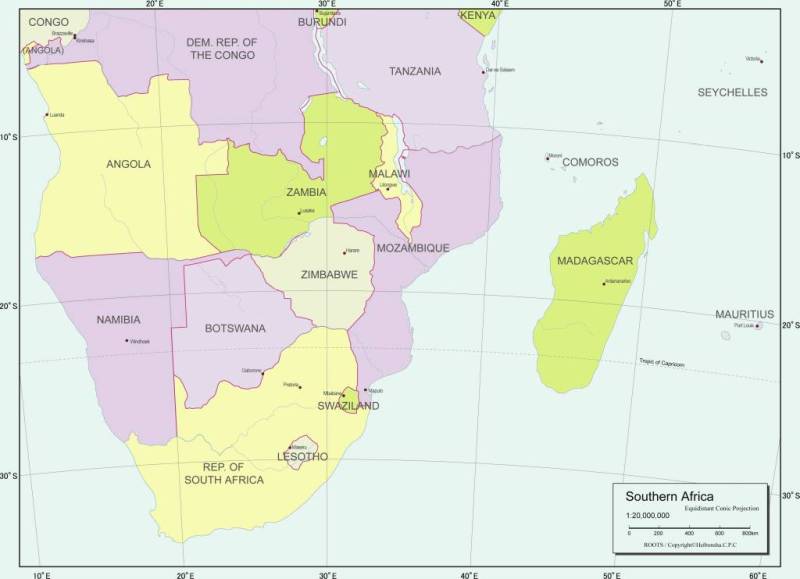
今回の水際強化策の対象となっている9カ国についていえば,ポルトガル語を公用語としているモザンビークを除いて,すべての国が英語を公用語(少なくとも公用語の1つ)として採用している(アフリカにおける英語公用語事情は「#3290. アフリカの公用語事情」 ([2018-04-30-1]) を参照).確かにこの地域の英語話者人口は多く,「#2472. アフリカの英語圏」 ([2016-02-02-1]) の人口統計を参照すると,数千万人という規模で存在することがわかる.世界的な英語地域の1つといってよい.
南部アフリカの英語化の歴史は,イギリスによる植民地化の歴史と連動している.南アフリカ共和国の英語化の淵源は他国に比べて早く18世紀末にさかのぼるが,他国も19世紀後半にはその流れに巻き込まれることになった.多くが第二次世界大戦後の20世紀半ば以降に独立を果たしたが,旧宗主国の言語である英語が威信ある言語として公用語に採用され,現在に至る.
南アフリカ共和国と英語の接触の歴史は複雑で,これまでも「#343. 南アフリカ共和国の英語使用」 ([2010-04-05-1]),「#407. 南アフリカ共和国と Afrikaans」 ([2010-06-08-1]),「#408. South African English と American English の変種構成の類似」 ([2010-06-09-1]),「#1703. 南アフリカの植民史と国旗」 ([2013-12-25-1]),「#3291. 11の公用語をもつ南アフリカ共和国」 ([2018-05-01-1]) などで紹介してきたので,そちらをどうぞ.
2021-11-20 Sat
■ #4590. World Englishes のサンプル [world_englishes][variety][scots_english][tok_pisin][pidgin][creole][aave][south_africa][nigeria][singapore_english]
本日11月20日(土)の 13:00?14:30 に,立命館大学国際言語文化研究所の主催する「国際英語文化の多様性に関する学際研究」プロジェクトの一環として「世界の "English" から "Englishes" の世界へ」のタイトルでお話しさせていただきます(立命館大学の岡本広毅先生,これまでのご準備等,ありがとうございます).Zoom による参加も可能ですので,ご関心のある方はこちらの案内をご覧ください.
また,今朝すでにアップした私の音声ブログ Voicy の番組 「英語の語源が身につくラジオ (heldio)」 では,「立命館大学,岡本広毅先生との対談:国際英語とは何か?」と題する対談を行なっていますので,そちらもぜひ聴いてみてください.
さて,"World Englishes" に関する講演ということで,本日のブログ記事としても世界の様々な英語のサンプルを示したいと思います.ただし "Englishes" の多様性を示すために部分を切り抜いたランダムなサンプルを挙げるにすぎませんので,その点はご了承を.本日の講演では,以下の例を用いて話し始めたいと思っています.よろしくどうぞ.
・ Northern English (Yorkshire): B. Hines, Kes (1968) [qtd. in Gramley 198]
Hey up, where's tha been? They've been looking all over for thee.
・ Scots Leid: Aboot William Loughton Lorimer (2009) [qtd. in Gramley 201]
Lorimer haed aye been interestit in the Scots leid (syne he wis a bairn o nine year auld he haed written doun Scots wirds an eedioms) an his kennin o the strauchles o minority leids that he got frae his readins o the nautral press durin the Weir led him tae feel that something needit daein tae rescue the Scots laid.
・ Tok Pisin: from Mühlhäusler (1986) [qtd. in Gramley 223]
em i tok se papa i gat sik ["he said that the father was sick"]
・ Hawaiian Creole English: from Bickerton (1981) [qtd. in Gramley 226]
Jan bin go wok a hospital ["John would have worked at the hospital"]
・ Jamaican Creole: "William Saves His Sweetheart" [qtd. in Gramley 238]
nóu wants dér wáz, a úol wíč liedi lív, had wán són, níem av wiljəm. ["Once upon a time there was an old witch, who had a son whose name was William."]
・ AAVE (= African American Vernacular English): A. Walker, The Color Purple (1982) [qtd. in Gramley 269]
I seen my baby girl. I knowed it was her. She look just like me and my daddy.
・ Cape Flats SAfE: Malan (1996) [qtd. in Gramley 300]
Now me and E. speaks English. And when we went one day to a workshop --- and uh, most of the teachers there were Africaans --- and we were there; they were looking at us like that you know. And I asked E., "Why's this people staring at us?" She said, "No, I don't know."
・ Nigerian English: "Igbo Girls Like Money a Lot" (2006) (qted. in Gramley 319)
Igbo girls are hardworking, smart, successful and independent so ain't nuffin wrong in them lookin for a hardoworkin, successful man. if u ain't gats the money, they aint gon want u cos u below their level of achievement.
・ Hong Kong English: Joseph (2004) [qtd. in Gramley 321]
However, as Hong Kong is going through an economic down turn recently, we shall have to see. . . Last year we have raised more than two million Hong Kong Dollars.
・ Singapore English [qtd. in Gramley 328]
The tans [= military unit] use to stay in Sarangoon.
・ Gramley, Stephan. The History of English: An Introduction. Abingdon: Routledge, 2012.
2018-05-01 Tue
■ #3291. 11の公用語をもつ南アフリカ共和国 [south_africa][official_language][afrikaans][language_planning][linguistic_right]
「#407. 南アフリカ共和国と Afrikaans」 ([2010-06-08-1]) で触れたように,南アには11の公用語が存在する.ヨーロッパ人植民者の伝統を引く English, Afrikaans のほか Sepedi, Sesotho, Setswana, siSwati, Tshivenda, Xitsonga, isiNdebele, isiXhosa, isiZulu といったアフリカ土着系諸言語が含まれる.これは1994年にマンデラ政権により制定された新憲法の第6条で規定されている.通常,憲法で公用語を定める場合には,1つか2つに限られることが多いが,11の言語名が列挙されるというのは尋常ではない.諸言語,諸民族の尊重という大義として理解することもできるが,実際にはいずれかに定められない南ア社会の現実を反映した苦しい選択ととらえるべきだろう.
南ア社会の厳しい現実の背景には,2つの要素がある.1つは,歴史的に影響力を保ってきた保守的な勢力としての Afrikaans の地位が,諸民族の橋渡し役としての英語に押され,追い越されてきたという勢力図の変化である.旧憲法では英語と Afrikaans の平等使用原則が謳われていたが,これが撤廃されたことにより,2言語間である種の自由競争が生まれ,結果として英語が抜きんでてきた.つまり,国内の言語として伝統的に優勢だった Afrikaans が「使用保障を失った」(山本,p. 233)ことによる,社会言語学的序列の再編成の帰結である.結果として誕生したヒエラルキーは,英語がトップに立ち,その下に Afrikaans が続き,その下に他の9言語が立ち並ぶという構図である.新憲法による公用語制定では11言語がフラットに列挙されており,ヒエラルキーが感じられないが,逆にいえば,まさにその点に南アの言語事情をめぐる苦悩がある.
もう1つの要素は,新憲法で11言語をフラットに並べていることからも示唆される通り,強制的な言語政策が放棄されたことである.結果,国民一人一人の自主的な言語選択が尊重されるようになってきた.山本 (235) 曰く,
政府による言語政策の強制がなくなったために,政府は基本方針を示すだけで,地域や学校,そして父母に教育言語に関する判断がゆだねられている.そのため,初等教育で家庭語 (home language) を使用するかどうか,使うなら何年間使用するか,家庭語から英語(もしくはアフリカーンス語)への切り替え時期は何年目にするか,などについて,極端に言えば,学校毎にやり方が異なっており,「南アの学校は?」というふうにひとくくりで論じることができない.また,伝統的アフリカーンス語系の学校にも黒人が入学するようになり,英語による教育を求めて,文化的伝統にこだわるアフリカーナーとトラブルになることもある.これも多言語・多文化社会の一つの姿である.
「11の公用語」は国民の言語権を守るものでもあるが,一方で南ア社会の複雑さを象徴するものでもある.その是非を論じるためには,歴史的な背景も含めて,状況をよく理解しておく必要がある.
南アフリカ共和国の英語事情については,「#343. 南アフリカ共和国の英語使用」 ([2010-04-05-1]) と「#1703. 南アフリカの植民史と国旗」 ([2013-12-25-1]) も参照.
・ 山本 忠行 「第10章 アフリカーンス語と英語のせめぎ合い」 河原俊昭(編著)『世界の言語政策 多言語社会と日本』 くろしお出版,2002年.225--45頁.
2013-12-25 Wed
■ #1703. 南アフリカの植民史と国旗 [south_africa][history][afrikaans][vexillology]
南アフリカ (South Africa) では,1/10ほどの国民が英語を母語として話している.その意味では ENL (English as a Native language) 国といってよいが,Afrikaans, Xhosa, Zulu ほか多くの言語が国民によって用いられており,英米のような ENL 国とは状況が異なる(「#177. ENL, ESL, EFL の地域のリスト」 ([2009-10-21-1]) を参照).南アフリカで話されている英語変種については,「#408. South African English と American English の変種構成の類似」 ([2010-06-09-1]) で簡単に取り上げたが,今日は同国植民史と国旗の話をしたい.
1488年,ポルトガルの航海士 Bartholomew Diaz (1450?--1500) が喜望峰 (Cape of Good Hope) を周回してアジアへと向かう航路を,ヨーロッパ人として初めて開拓した.その後,多くのヨーロッパ船がこの航路を往来したが,17世紀初頭にはオランダとイギリスがこの航路のポルトガルによる独占支配に挑戦するようになった.1652年,オランダ東インド会社が,船舶のための供給基地として Table Bay (現在の Cape Town)に植民地を建設した.オランダ人植民者はオランダ語で農民を意味する Boer と呼ばれるようになり,後に Afrikaner とも呼称された.彼らはアフリカ各地,インド,マレーシアなどからの労働者を使役し,農業を営んで内陸部へ進出していった.そして,Khoekhoe や San などの先住民族と衝突すると,打ち負かしていった.
1795年,イギリスが Cape 植民地をオランダから奪い,1814年に買い取った.1820年,イギリスは,ボーア人とコサ族 (Xhosa) との紛争に割って入り,両者の新植民地を建設した.これによりイギリスの支配権は強まったが,地域の不安は増した.1830年代から40年代初頭にかけて,反抗するボーア人が Cape 植民地を脱出し,北部への移住 (the Great Trek) を開始した.結果として,1850年代にボーア人によりトランスヴァール国 (Transvaal) とオレンジ自由国 (Orange Free State) が建国された.
19世紀後半,金山が発見されると,イギリス人やドイツ人がこの地に押し寄せた.イギリス植民地 Natal とボーア人の Transvaal との間で緊張が高まり,後者が前者に軍事侵略したことで,ボーア戦争 (the Boer War; 1880--81, 1899--1902) が勃発.1902年にボーア人が降伏し,ボーア人の両共和国はイギリス植民地となった.1910年,Cape, Natal, Transvaal, Orange Free State の4植民地は,長い協議を経て,南アフリカ連邦 (Union of South Africa) へと統合.1961年に現在の南アフリカ共和国の名前に変わった.
南アフリカは以上のような複雑な植民史を経ており,国旗もそれを反映している.現在の国旗は下に掲げた左側のもので,6色(使用色数は世界最多)のデザインだが,これは1994年に改められたものである.それ以前の1928--94年には右側のような図案が用いられていた.この図案では,大きな国旗の中に3つの小さな国旗が配置されている.大きな黄白青の横縞の国旗は昔のオランダの国旗である.小さな国旗については,左が Union Jack,中央がオレンジ自由国の国旗,右がトランスヴァール国の国旗である.中央と右のものには,赤白青の縞が見えるが,これは現在のオランダの国旗である.つまり,全体としてオランダのルーツ(ボーア人)をとどめながらも,イギリス植民地としての歴史をも刻んでいる,植民史を体現したような国旗だったといえよう.
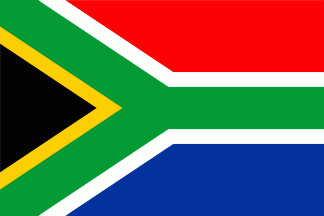 | 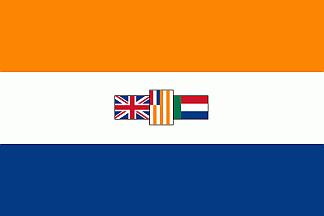 |
2010-06-09 Wed
■ #408. South African English と American English の変種構成の類似 [south_africa][afrikaans][ame][variety][map]
昨日の記事[2010-06-08-1]では,17世紀のオランダ語に基づいて南アフリカで独自の発達をとげてきた Afrikaans を話題にした.南アでは Afrikaans と並んで英語も広く理解され,民族の壁を超えて国内コミュニケーションに供している.英語は,母語としては人口の1割ほどが使用するに過ぎないが,非母語としては人口の半分ほどが理解するといわれる.このように ENL と ESL が共存する興味深い国であることは,[2010-04-05-1]の記事でも取りあげた.
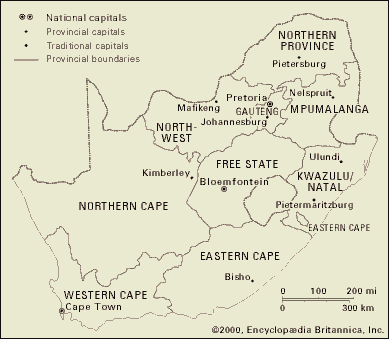
南アでの英語使用は19世紀初めにイギリスがオランダより the Cape を購入した時期に遡るが,本格的には1820年以降にイギリス人が大規模な移民を行うようになってからのことである.イギリス移民の最初期には,主に南東イングランドの田舎出身者が多く,かれらは Eastern Cape へ入った.このときの英語は諸言語との混交を経て,独特の変種を発達させた.これは Cape English と呼ばれる.
次の大規模移民は19世紀半ばに行われた.このときには社会階級の高い者が多く,Yorkshire や Lancashire など北イングランド諸州からの移民が多かった.かれらは Natal に住み着き,後に本国とも連絡を取り続けたため,この英語変種は威信のあるイギリス標準英語に近いままに保たれた.これは Natal English と呼ばれる.また,特定の地域に限定されず南アで広く聞かれる General South African English と呼ばれる変種も発達した.
上記の状況は,アメリカの変種の生まれた過程や現在の分布に似ている.主にイングランド西部からの植民者がアメリカ南部に Jamestown を設立してアメリカ南部方言の端緒を開き,主にイングランド東部からの植民者がアメリカ北東部を開拓して New England 方言の祖となった.一方,イングランド中部・北部やスコットランドなどからアメリカ中部に展開した植民者は,General American と呼ばれる地域色の薄いアメリカ英語変種の種を蒔いた.実際には移民の歴史はそう単純ではなく,いずれの変種も程度の差はあれ他変種との混交によって発展してきているが,移民元と移民先の変種に連続性があるという点では南アとアメリカの状況は比較される.実のところ,このような連続性は南アやアメリカのみならず,母語としての英語が移植された旧イギリス植民地では広く見られる現象である.
ちなみに,南アには上に挙げた英語三変種のほかに,独特な South African Indian English も聞かれる.1860年代以降,インド人が労働力として Natal に連れて来られ,後に独特な英語変種を話すようになったものである.
南アだけを見ても英語変種は少なくない.いわんや世界をや.
・ Svartvik, Jan and Geoffrey Leech. English: One Tongue, Many Voices. Basingstoke: Palgrave Macmillan, 2006. 112--15.
2010-06-08 Tue
■ #407. 南アフリカ共和国と Afrikaans [south_africa][afrikaans][map]
今月は FIFA World Cup の開催で South Africa が熱い.South Africa の英語使用については[2010-04-05-1]の記事で触れたが,今日は英語とも親戚関係にある Afrikaans を話題にする.
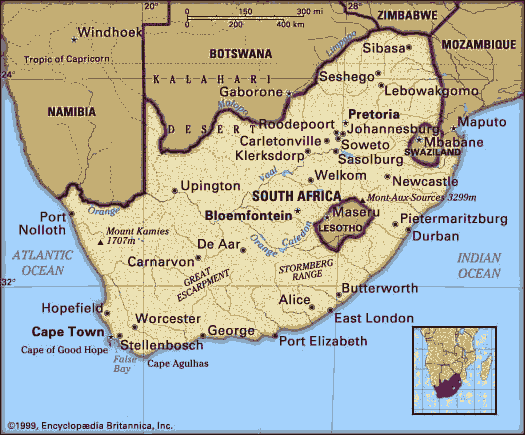
南アの言語構成は複雑である.1993年の憲法によると,実に11の言語が公用語として認定されている.Afrikaans, English, Ndebele, North Sotho, South Sotho, Swazi (Swati), Tsonga, Tswana, Venda, Xhosa, Zulu.このなかでも Afrikaans は英語と並んで,第一言語としても第二言語としても国内で広く影響力を保っている言語である.Afrikaans はゲルマン語派の系統図 ( [2009-10-26-1] ) にも組み込まれているとおり,英語とは広い意味で親戚関係にある.アフリカの南端でなぜヨーロッパに端を発する二つの西ゲルマン語が話されているかというと,オランダとイギリスによる植民地の歴史が背景にあるからである.1652年,オランダ東インド会社は南西端の喜望峰 ( the Cape of Good Hope ) に交易所を設けた.このときに当時のオランダ語 ( Dutch ) が持ちこまれ,現在おこなわれている Afrikaans ( 別名 Cape Dutch ) の種が蒔かれた.オランダ語の一変種として種が蒔かれた後は,ドイツやフランスからの移民,原住民の Khoisan,アフリカやアジアからの奴隷による使用により言語変化を経て,言語体系は非常に簡略化してきた.Afrikaans は文法カテゴリーとして格 ( case ) や性 ( gender ) を失なっており,この点で英語ともよく似ている.両言語とも,諸民族に揉まれるなかで簡略化を経てきたと言えるだろう.
Afrikaans についてはオランダ語との関係で,[2009-09-22-1]の記事でも少し触れているのでそちらも要参照.Ethnologue の Afrikaans の記述も参照.
2010-06-03 Thu
■ #402. Southern Hemisphere Shift [gvs][vowel][language_change][new_zealand_english][australian_english][south_africa]
[2010-05-28-1]の記事で米国の北部都市で起こっている短母音の体系的推移である Northern Cities Shift に触れた.NCS は非常に稀な短母音推移の例として英語史的な意義を付与されることがあるが,実のところ体系的な短母音推移は英語の他の変種でも起こっている.例えば Australian English ( AusE ), New Zealand English ( NZE ), South African English ( SAE ) の主要変種に共通して生じている短母音推移 ( Southern Hemisphere Shift ) が挙げられる.SHS では,以下のような連鎖的な推移 ( chain shift ) が認められる.
/æ/ -> /e/ -> /ɪ/ -> /i/ or /ə/
/ɪ/ が推移する先は,AusE では /i/,NZE では /ə/ になるという差異はあるが,全体として南半球としてまとめてよい程度に共通している.電話口で父親を出してくれと言われて父親に受話器を渡すとき,Here's Dad というところが He's dead の発音になってしまうので注意が必要である.
個人的な体験としては,しばらく New Zealand に滞在していたときに,bread が /brɪd/ あるいは /bri:d/ とすら発音されているのにとまどった.パンのことを言っているのだと気付くまでにしばらくかかった.また,滞在先にいた小学生に Sega のテレビゲームを一緒にやろうと誘われているのを cigar と聞き違えて,何か麻薬の誘いだろうかと驚いたこともある.
英語史上に有名な,長母音に生じた大母音推移 Great Vowel Shift ([2009-11-18-1]) の陰で,短母音系列の推移は目立たない.確かに長母音に比べると安定しているのは確かなようだが,標準的な変種から一歩離れてみてみると NCS や SHS の例がみられる.稀な単母音推移として NCS や SHS に付与される英語史上の意義というのも,どの変種を英語史の代表選手と考えるかによって価値が変わってくる相対的な意義であることを確認しておく必要があるだろう.
・ Svartvik, Jan and Geoffrey Leech. English: One Tongue, Many Voices. Basingstoke: Palgrave Macmillan, 2006. 108--09.
2010-04-05 Mon
■ #343. 南アフリカ共和国の英語使用 [south_africa][elf]
母語としての英語 ( ENL ) を代表する地域として挙げられるのは普通,以下の国々ではないだろうか.アメリカ合衆国,イギリス,カナダ,オーストラリア,ニュージーランド,アイルランド.いわば英語語学留学に行ける国と考えるとイメージしやすい.( see [2009-10-17-1], [2009-10-21-1], [2009-11-28-1] )
では,南アフリカ共和国 ( Republic of South Africa ) はどうだろう.南アは英語国として言及されることがあり,世界英語 ( World Englishes ) の話題でよく取り上げられる国である.しかし,上の5カ国と同グループに入れるのには違和感があるのではないか.世界の英語使用について ENL と ESL という区分を認めるとすると,南アフリカ共和国は,確かに両者の性質を合わせもった微妙な位置取りをしているのである.
典型的な ENL 国では,国民の大多数が「アングロサクソン系」 の白人であり,イギリス英語の伝統を多かれ少なかれ受け継ぎつつ,公私の場で英語を母語として使用している.一方,典型的な ESL 国では,母語として英語を話す人口は存在するとしてもごく僅かであり,英語はあくまで第2言語として習得され,歴史的・政治的・文化的な機能を担う言語として存在している.
上の典型の記述からわかるとおり,ENL と ESL が水を漏らさぬ相補的な関係であるわけではない.その隙間をつくような地域が存在するのも無理からぬことである.南アには「アングロサクソン系」の白人で英語を母語としている人口が存在する.しかし,典型的な ENL 国とは異なり,かれらが国民の大多数を構成しているわけではない.英語母語話者は10%ほどである.この10%という ENL 人口は多くもないが少なくもない.この中途半端な人口比こそが,南アの微妙な位置取りの主たる原因である.国内での英語使用をみてみると,政治的・文化的な機能が強く,この点では明らかに ESL 的である.
ENS と ESL という伝統的な区分のもとで,南アはいずれの側からも周辺的な存在とみなされる不遇(?)をかこってきたように思う.近年の議論では伝統的な英語話者の区分の妥当性が問われるようになってきており,南アはそのような議論に独自の例を提供できる立場にあるのではないか.
Powered by WinChalow1.0rc4 based on chalow